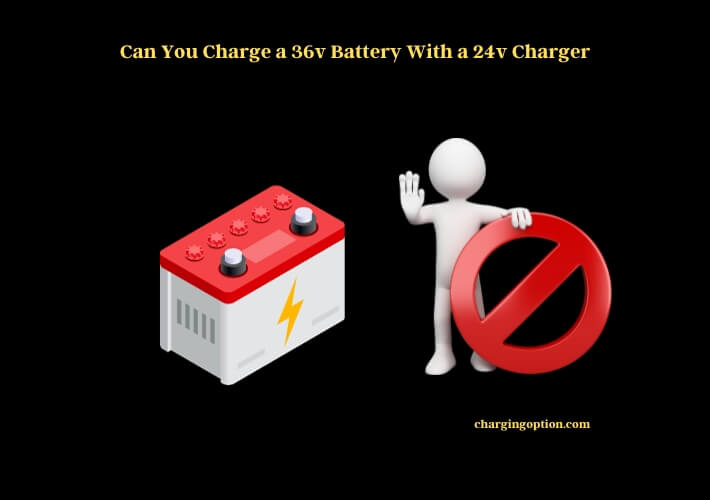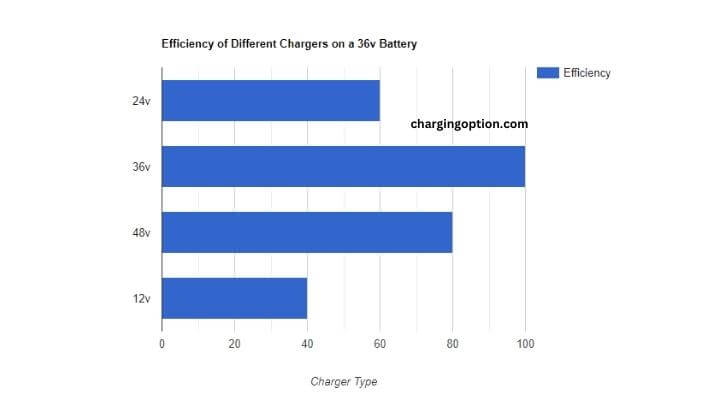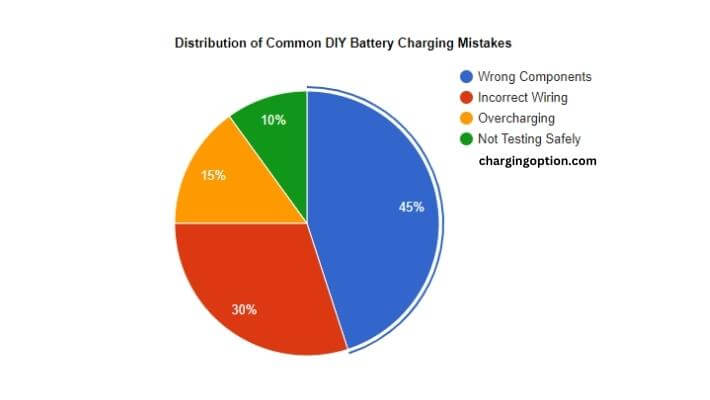No, charging a 36v battery with a 24v charger is not recommended. Always use the appropriate charger for your battery to ensure safety and longevity.
Using the correct charger for a battery is crucial for its health and safety. For instance, if you have a 36v battery, it’s not advisable to use a 48v charger. This mismatch can lead to overcharging, which can damage the battery or even cause a fire. Similarly, using a 12v charger for a 36v battery is inefficient and may not provide enough power to charge the battery fully. If you find yourself without the right charger, it’s better to seek alternatives like purchasing a new one or finding a compatible charger rather than risking potential harm.

Making a 36-volt battery charger requires knowledge of electronics and the right components. It’s not a task for the inexperienced. On the other hand, if you have a 24v battery, using a 20v charger might not be sufficient to charge it fully. For those with multiple 12v batteries, a 36v charger can be used to charge three 12v batteries connected in series. It’s essential to monitor the charging process to avoid overcharging. The time it takes to charge a 36v battery varies based on its capacity and the charger’s output.
For a more in-depth discussion on this topic, we invite you to read the detailed article below.
The Basics of Battery Charging
Understanding Voltage and Current
Ever wondered why your phone charger can’t juice up your laptop? It’s all about voltage and current. Think of voltage as the pressure pushing electricity through a circuit, while current is the flow rate of that electricity. Just as you wouldn’t use a garden hose to fill a swimming pool, you wouldn’t use a low-voltage charger for a high-voltage battery.
How Chargers and Batteries Interact
Imagine a dance between two partners: the charger and the battery. The charger leads, providing the energy, while the battery follows, receiving and storing it. If the charger leads with the wrong steps (or voltage), the dance can quickly go awry. It’s essential for both to be in sync for a smooth performance.
The Risks of Mismatched Voltages
Potential for Battery Damage
Mismatching charger and battery voltages is like trying to fit a square peg in a round hole. It might work for a while, but eventually, something’s got to give. In this case, it’s often the battery that suffers, leading to reduced capacity or complete failure.
Safety Concerns: Overheating and Fire Hazards
Remember the last time you touched something too hot? Batteries can feel the same way if charged incorrectly. Overcharging can cause them to overheat, and in extreme cases, even catch fire. It’s not just about the battery’s health; it’s about your safety too.
Impact on Battery Lifespan
Just like overwatering a plant can stunt its growth, overcharging a battery can shorten its lifespan. It’s not just about the immediate risks; consistently using the wrong charger can lead to long-term damage and reduced battery life.
Real-world Scenarios and Outcomes
| Charger Voltage | Battery Voltage | Outcome |
| 24v | 36v | Inefficient, potential undercharge |
| 48v | 36v | Risk of overcharge and damage |
| 12v | 36v | Highly inefficient |
| 36v | 36v | Ideal |
Alternatives to Using a 24v Charger
Using a Universal Charger
Universal chargers are like the Swiss Army knives of the charging world. They come with multiple voltage settings, ensuring you always have the right fit for your battery. Handy, right?
The Benefits of Multi-Voltage Chargers
Ever wished for a one-size-fits-all solution? Multi-voltage chargers might be the answer. They can adapt to various battery voltages, making them a versatile tool in your charging arsenal.
Seeking Professional Advice
Not sure which charger to use? It’s always a good idea to ask the experts. Whether it’s the manufacturer, a local technician, or a knowledgeable friend, getting a second opinion can save you a lot of headaches.
The Science Behind Proper Charging
The Role of Battery Chemistry
Batteries aren’t just about voltage; they have a unique chemical makeup too. Whether it’s lithium-ion, nickel-cadmium, or lead-acid, each type has its own charging needs. It’s like baking; you wouldn’t use salt instead of sugar, would you?
Importance of Correct Charging Cycles
Charging isn’t just plug and play. Batteries have cycles, periods where they charge and discharge. Respecting these cycles ensures your battery stays healthy and performs at its best.

DIY Solutions and Their Limitations
Making Your Own 36v Charger
Crafting your own charger might sound like a fun project, but it’s not for the faint of heart. It requires a good grasp of electronics and the right components. It’s a bit like building a puzzle; every piece must fit perfectly.
Precautions to Take When Going the DIY Route
Going DIY? Cool! But remember, with great power comes great responsibility. Always double-check your work, ensure you’re using the right components, and test in a safe environment.

Tools to Assist in Safe Charging
Battery Management Systems (BMS)
Think of a BMS as the guardian angel of your battery. It monitors the battery’s performance, ensures it’s charging correctly, and steps in if things go south. It’s an extra layer of protection for your battery.
Smart Chargers and Their Advantages
Smart chargers are, well, smart! They can adapt to the battery’s needs, ensuring it gets the right amount of juice without overcharging. It’s like having a personal chef who knows exactly how you like your steak.
Infographic: Steps to Ensure Safe Battery Charging
Step 1
Choose the right charger for your battery type and voltage.
Step 2
Monitor the charging process to avoid overcharging.
Step 3
Always use a Battery Management System for added safety.
Step 4
Consider using a smart charger for optimal charging.
Calculator for Charging Time
Want to know how long it’ll take to charge your battery? Use this handy calculator!
Frequently Asked Questions (FAQs)
What Happens If You Use a 24v Charger on a 36v Battery?
Using a 24v charger on a 36v battery can result in the battery not receiving enough power to charge fully. This mismatch can lead to prolonged charging times and may not provide the battery with the energy it needs to function correctly.
Is It Safe to Use a Mismatched Charger and Battery?
No, using mismatched chargers and batteries can pose risks. Besides the potential for inefficient charging, there’s a risk of damaging the battery. In extreme cases, it can even lead to safety hazards like overheating or fire. Always use the appropriate charger for your battery.
What Are the Signs of a Battery Being Overcharged or Undercharged?
Signs of overcharging include the battery becoming hot to the touch, swelling, or leaking. On the other hand, signs of undercharging can be less obvious but may include the battery not holding a charge for as long as it used to or the device powered by the battery not operating at full capacity.
Can You Use a Universal Charger for a 36v Battery?
Yes, universal chargers are designed to accommodate various battery voltages. If you’re using a universal charger, ensure it has a setting for 36v and that it’s selected before charging. This ensures the battery gets the right amount of power.
How Can You Ensure Safe Charging Practices?
To ensure safe charging, always use the correct charger for your battery, monitor the charging process, and avoid leaving the battery to charge unattended for extended periods. It’s also beneficial to use tools like Battery Management Systems (BMS) or smart chargers that adjust the charging process based on the battery’s needs.
Are There Any Alternatives If I Don’t Have the Right Charger?
If you don’t have the correct charger, consider purchasing a new one that matches your battery’s specifications. Alternatively, universal or multi-voltage chargers can be a versatile solution. In any case, it’s always a good idea to consult with experts or the battery manufacturer for guidance.
Navigating the world of batteries and chargers can feel like a maze. But with the right knowledge, tools, and precautions, you can ensure your battery’s health and safety. Whether you’re considering a DIY solution, seeking professional advice, or just curious about the science behind it all, it’s always best to be informed. Remember, it’s not just about getting a charge; it’s about doing it right.
